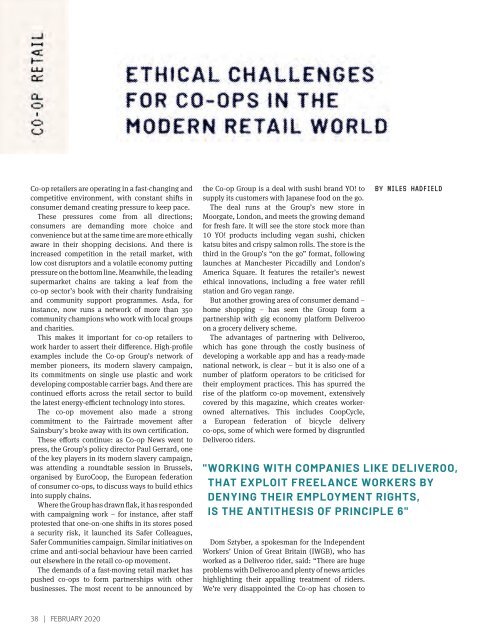Co-op News - February 2020
Co-operative Retail: ethical challenges in the modern world
Co-operative Retail: ethical challenges in the modern world
Create successful ePaper yourself
Turn your PDF publications into a flip-book with our unique Google optimized e-Paper software.
<strong>Co</strong>-<strong>op</strong> retailers are <strong>op</strong>erating in a fast-changing and<br />
competitive environment, with constant shifts in<br />
consumer demand creating pressure to keep pace.<br />
These pressures come from all directions;<br />
consumers are demanding more choice and<br />
convenience but at the same time are more ethically<br />
aware in their sh<strong>op</strong>ping decisions. And there is<br />
increased competition in the retail market, with<br />
low cost disruptors and a volatile economy putting<br />
pressure on the bottom line. Meanwhile, the leading<br />
supermarket chains are taking a leaf from the<br />
co-<strong>op</strong> sector’s book with their charity fundraising<br />
and community support programmes. Asda, for<br />
instance, now runs a network of more than 350<br />
community champions who work with local groups<br />
and charities.<br />
This makes it important for co-<strong>op</strong> retailers to<br />
work harder to assert their difference. High-profile<br />
examples include the <strong>Co</strong>-<strong>op</strong> Group’s network of<br />
member pioneers, its modern slavery campaign,<br />
its commitments on single use plastic and work<br />
devel<strong>op</strong>ing compostable carrier bags. And there are<br />
continued efforts across the retail sector to build<br />
the latest energy-efficient technology into stores.<br />
The co-<strong>op</strong> movement also made a strong<br />
commitment to the Fairtrade movement after<br />
Sainsbury’s broke away with its own certification.<br />
These efforts continue: as <strong>Co</strong>-<strong>op</strong> <strong>News</strong> went to<br />
press, the Group’s policy director Paul Gerrard, one<br />
of the key players in its modern slavery campaign,<br />
was attending a roundtable session in Brussels,<br />
organised by Euro<strong>Co</strong><strong>op</strong>, the Eur<strong>op</strong>ean federation<br />
of consumer co-<strong>op</strong>s, to discuss ways to build ethics<br />
into supply chains.<br />
Where the Group has drawn flak, it has responded<br />
with campaigning work – for instance, after staff<br />
protested that one-on-one shifts in its stores posed<br />
a security risk, it launched its Safer <strong>Co</strong>lleagues,<br />
Safer <strong>Co</strong>mmunities campaign. Similar initiatives on<br />
crime and anti-social behaviour have been carried<br />
out elsewhere in the retail co-<strong>op</strong> movement.<br />
The demands of a fast-moving retail market has<br />
pushed co-<strong>op</strong>s to form partnerships with other<br />
businesses. The most recent to be announced by<br />
the <strong>Co</strong>-<strong>op</strong> Group is a deal with sushi brand YO! to<br />
supply its customers with Japanese food on the go.<br />
The deal runs at the Group’s new store in<br />
Moorgate, London, and meets the growing demand<br />
for fresh fare. It will see the store stock more than<br />
10 YO! products including vegan sushi, chicken<br />
katsu bites and crispy salmon rolls. The store is the<br />
third in the Group’s “on the go” format, following<br />
launches at Manchester Piccadilly and London’s<br />
America Square. It features the retailer’s newest<br />
ethical innovations, including a free water refill<br />
station and Gro vegan range.<br />
But another growing area of consumer demand –<br />
home sh<strong>op</strong>ping – has seen the Group form a<br />
partnership with gig economy platform Deliveroo<br />
on a grocery delivery scheme.<br />
The advantages of partnering with Deliveroo,<br />
which has gone through the costly business of<br />
devel<strong>op</strong>ing a workable app and has a ready-made<br />
national network, is clear – but it is also one of a<br />
number of platform <strong>op</strong>erators to be criticised for<br />
their employment practices. This has spurred the<br />
rise of the platform co-<strong>op</strong> movement, extensively<br />
covered by this magazine, which creates workerowned<br />
alternatives. This includes <strong>Co</strong><strong>op</strong>Cycle,<br />
a Eur<strong>op</strong>ean federation of bicycle delivery<br />
co-<strong>op</strong>s, some of which were formed by disgruntled<br />
Deliveroo riders.<br />
Dom Sztyber, a spokesman for the Independent<br />
Workers’ Union of Great Britain (IWGB), who has<br />
worked as a Deliveroo rider, said: “There are huge<br />
problems with Deliveroo and plenty of news articles<br />
highlighting their appalling treatment of riders.<br />
We’re very disappointed the <strong>Co</strong>-<strong>op</strong> has chosen to<br />
BY MILES HADFIELD<br />
"WORKING WITH COMPANIES LIKE DELIVEROO,<br />
THAT EXPLOIT FREELANCE WORKERS BY<br />
DENYING THEIR EMPLOYMENT RIGHTS,<br />
IS THE ANTITHESIS OF PRINCIPLE 6"<br />
38 | FEBRUARY <strong>2020</strong>


















